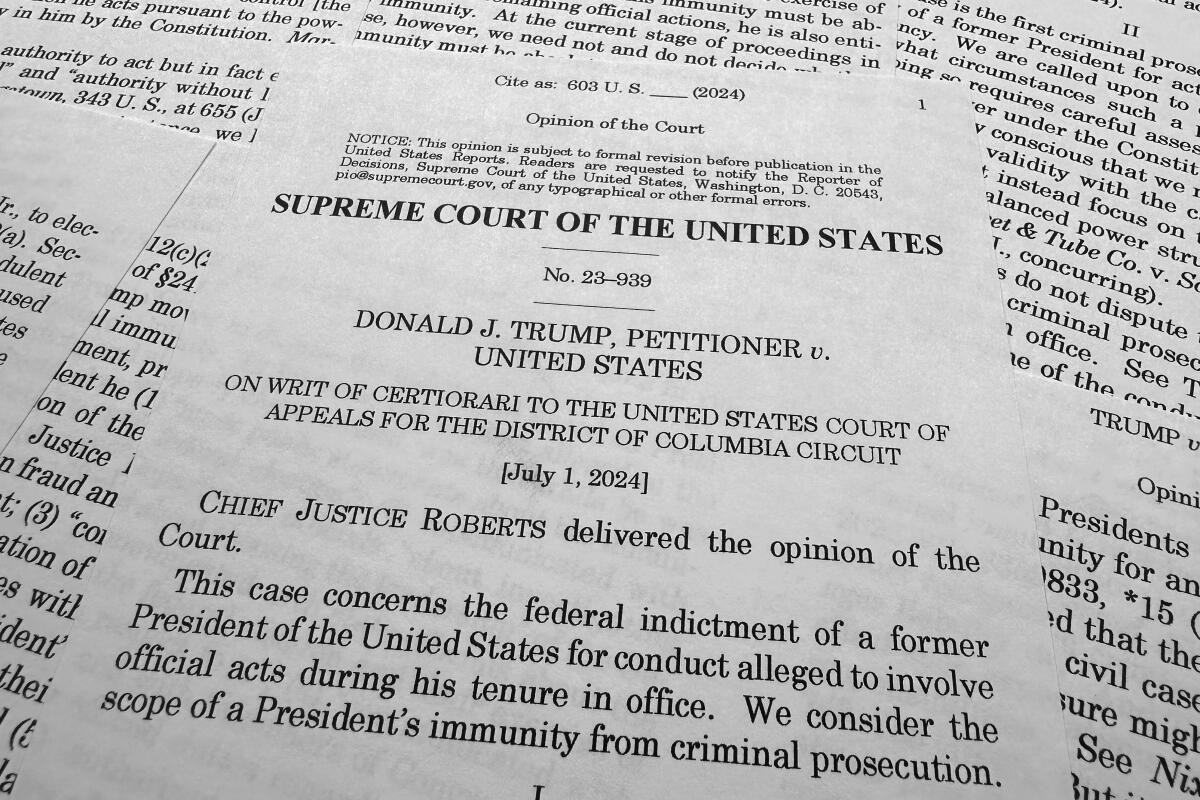We should all dissent from the Supreme Court’s immunity decision, and not respectfully

- Share via
As Justice Sonia Sotomayor powerfully said in her dissent in Trump vs. United States, the Supreme Court on Monday made “a mockery of the principle, foundational to our Constitution and system of Government, that no man is above the law.” In a 6-3 decision, the six Republican-appointed justices handed a stunning victory to Donald Trump in broadly defining the scope of absolute presidential immunity from criminal prosecution.
Donald Trump was indicted in federal district court in Washington for his role in attempting to undermine the results of the November 2020 presidential election. Trump moved to dismiss the indictment on the grounds that his actions occurred while he was still in the White House and that a president has absolute immunity from criminal prosecution for anything done while in office. Both the federal district court and the United States Court of Appeals rejected this argument, stressing that the core of the rule of law is that no one, not even a president, is above the law.
The Supreme Court ruled that former President Trump cannot be prosecuted for his official acts while in office.
Although the Supreme Court did not go as far as Trump wanted, its ruling is a clear victory for him and for future presidents. In an opinion by Chief Justice John G. Roberts Jr., the court said that a president has absolute immunity for his official acts. The court expansively defined this as anything done in carrying out the constitutional powers of the president or in implementing a federal statute. The conservative majority then went further and said, “We conclude that the separation of powers principles explicated in our precedent necessitate at least a presumptive immunity from criminal prosecution for a president’s acts within the outer perimeter of his official responsibility.” And Roberts said that a court cannot look at a president’s motives.
The breadth of this immunity is stunning. Imagine, to use an example that was raised at the oral arguments, that a president orders the Navy Seals to kill a political rival. Under the court’s approach that would be protected by absolute immunity because it is an action taken by the president carrying out his powers as commander in chief. The court was explicit that the president’s craven political motives are irrelevant.
The homelessness and ‘Chevron deference’ Supreme Court decisions change law for the worse. They never would have happened if Hillary Clinton had won in 2016.
Or imagine that a president orders the Justice Department to investigate and indict a political rival solely to gain a political advantage. Or imagine, as Trump has already pledged, that if again elected president he would use the Justice Department for retribution and to prosecute his opponents. That, too, would clearly be protected by absolute immunity under the court’s decision. In fact, Roberts wrote: “The President cannot be prosecuted for conduct within his exclusive constitutional authority. Trump is therefore absolutely immune from prosecution for the alleged conduct involving his discussions with Justice Department officials.” Indeed, the court went so far as to say that Trump’s pressuring Vice President Mike Pence to ignore the results of the electoral college decision had a presumption of absolute immunity.
The court said that private or personal acts of a president, as opposed to official ones, are not protected by absolute immunity from prosecution. The court left open the question of whether there is absolute immunity for Trump’s pressuring state election officials, such as in Georgia, and for his conduct on Jan. 6. The court remanded these questions to the lower courts to decide. But even this is a victory for Trump in that the court did not declare the obvious: These unquestionably were personal and political actions.
A rundown of the 10 most significant Supreme Court rulings of the 2024 term.
It is for this reason that Sotomayor in her dissent says that the justices “in effect, completely insulate Presidents from criminal liability.” As she says, it is “an expansive vision of Presidential immunity that was never recognized by the Founders, any sitting President, the Executive Branch, or even President Trump’s lawyers, until now.”
In the past, when the court has dealt with issues like this, it has been unanimous and stressed the importance of holding a president accountable and upholding the rule of law. In United States vs. Nixon, in 1974, the court unanimously held that President Nixon could not invoke executive privilege to thwart a criminal investigation. In Clinton vs. Jones, in 1997, the court unanimously ruled that President Clinton had no immunity to protect him from a lawsuit for sexual harassment that occurred when he was governor of Arkansas.
But we live in a very different, far more partisan time. It is impossible to read the decision in Trump vs. United States as other than a court with six Republican justices handing a major victory to the Republican candidate for president, Donald Trump. Indeed, the court’s handling of the case, denying review that was requested in January and then not releasing its opinion until July 1, was in itself a victory in ensuring that there is no way that Trump can be tried before the November 2024 presidential election.
Roberts concluded his opinion by rightly saying: “This case poses a question of lasting significance.” Unfortunately, the court gave an answer to that question that undermines the rule of law and creates a serious future threat to our democracy in placing the president largely above the law.
Erwin Chemerinsky is a contributing writer to Opinion and the dean of the UC Berkeley School of Law.
More to Read
A cure for the common opinion
Get thought-provoking perspectives with our weekly newsletter.
You may occasionally receive promotional content from the Los Angeles Times.









